主要英语国家名称学习资料
英语:背景知识之国家名称
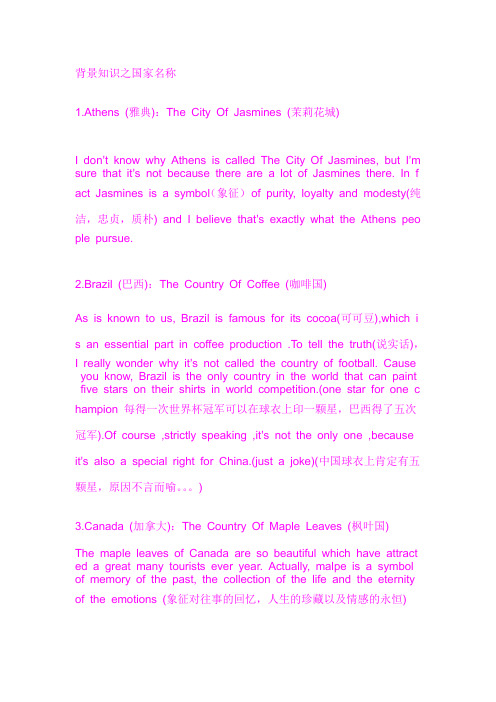
背景知识之国家名称1.Athens (雅典):The City Of Jasmines (茉莉花城)I don’t know why Athens is called The City Of Jasmines, but I’m sure that it’s not because there are a lot of Jasmines there. In f act Jasmines is a symbol(象征)of purity, loyalty and modesty(纯洁,忠贞,质朴) and I believe that’s exactly what the Athens peo ple pursue.2.Brazil (巴西):The Country Of Coffee (咖啡国)As is known to us, Brazil is famous for its cocoa(可可豆),which i s an essential part in coffee production .To tell the truth(说实话),I really wonder why it’s not called the country of football. Cause you know, Brazil is the only country in the world that can paint five stars on their shirts in world competition.(one star for one c hampion 每得一次世界杯冠军可以在球衣上印一颗星,巴西得了五次冠军).Of course ,strictly speaking ,it’s not the only one ,because it’s also a special right for China.(just a joke)(中国球衣上肯定有五颗星,原因不言而喻。
英语_国家国籍语言首都_资料
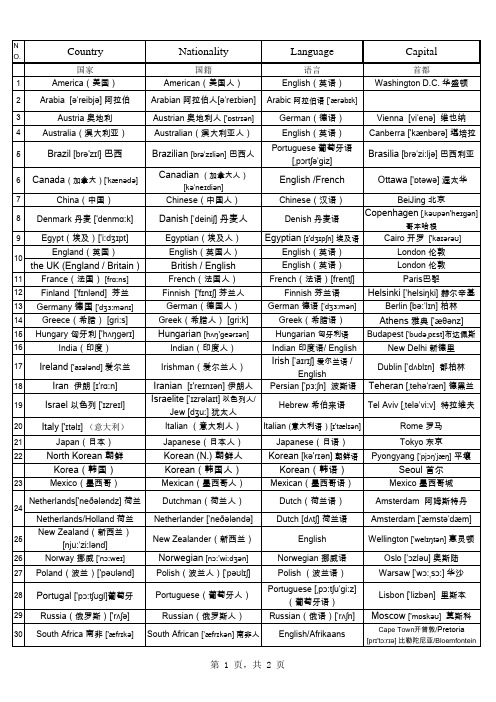
11 Franc39;fɪnlənd] 芬兰
13 Germany 德国 ['dʒɜ:mənɪ]
14 Greece(希腊) [ɡri:s]
15 Hungary 匈牙利 ['hʌŋɡərɪ]
16
India(印度)
17 Ireland ['aɪələnd] 爱尔兰
Chinese(汉语)
BeiJing 北京
Denish 丹麦语
Copenhagen [ˌkəʊpən'heɪɡən]
哥本哈根
Egyptian [ɪ'dʒɪpʃn] 埃及语
Cairo 开罗 ['kaɪərəʊ]
English(英语)
London 伦敦
English(英语)
London 伦敦
French(法语)[frentʃ]
18
Iran 伊朗 [ɪ'rɑ:n]
19 Israel 以色列 ['ɪzreɪl]
20 Italy ['ɪtəlɪ] (意大利)
21
Japan(日本)
22
North Korean 朝鲜
Korea(韩国)
23
Mexico(墨西哥)
Austrian 奥地利人 ['ɒstrɪən]
German(德语)
Vienna [viˈenə] 维也纳
Irishman(爱尔兰人)
Iranian [ɪ'reɪnɪən] 伊朗人 Israelite [ˈɪzrəlaɪt] 以色列人/
Jew [dʒu:] 犹太人
Portuguese 葡萄牙语 Brasilia [brəˈzi:ljə] 巴西利亚
[ˌpɔrtʃəˈɡiz]
英语国家概况必背
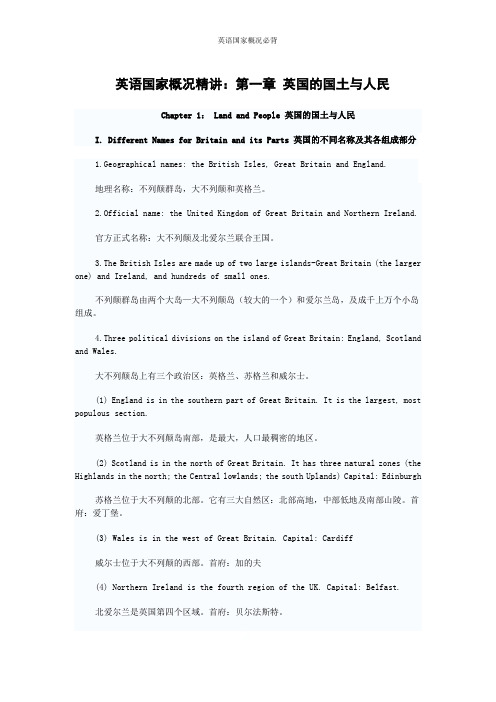
英语国家概况精讲:第一章英国的国土与人民Chapter 1: Land and People 英国的国土与人民I. Different Names for Britain and its Parts 英国的不同名称及其各组成部分1.Geographical names: the British Isles, Great Britain and England.地理名称:不列颠群岛,大不列颠和英格兰。
2.Official name: the United Kingdom of Great Britain and Northern Ireland.官方正式名称:大不列颠及北爱尔兰联合王国。
3.The British Isles are made up of two large islands-Great Britain (the larger one) and Ireland, and hundreds of small ones.不列颠群岛由两个大岛—大不列颠岛(较大的一个)和爱尔兰岛,及成千上万个小岛组成。
4.Three political divisions on the island of Great Britain: England, Scotland and Wales.大不列颠岛上有三个政治区:英格兰、苏格兰和威尔士。
(1) England is in the southern part of Great Britain. It is the largest, most populous section.英格兰位于大不列颠岛南部,是最大,人口最稠密的地区。
(2) Scotland is in the north of Great Britain. It has three natural zones (the Highlands in the north; the Central lowlands; the south Uplands) Capital: Edinburgh苏格兰位于大不列颠的北部。
英语国家概况__谢福之_复习资料

Chapter 1全名: the United Kingdom of Great Britain (大不列颠联合王国)(大不列颠联合王国) and Northern Ireland (北爱尔兰)(北爱尔兰) 由成千上万的小岛组成(the British Isles ). 两大岛屿:Great Britain (大不列颠)(大不列颠) and Ireland (爱尔兰)(爱尔兰)The River Thames (second longest and most important), originates (起源于) in southwestern England -----North Sea. Scotland ( Edinburgh 爱丁堡爱丁堡 ) important river:Clyde River kilts (苏克兰小短裙)(苏克兰小短裙) Wales ( Cardiff 加迪夫,著名港口 ). The Severn River is the longest river of Britain------flow through western England. Northern Ireland (Belfast 贝尔法斯特,首府) Lough Lough Neagh----the Neagh----the Neagh----the largest largest largest lake lake lake in in in the the British Isles. Climate : temperate, with warm summers, cool winters and plentiful precipitation(降雨量),冬暖夏凉,降雨充沛暖夏凉,降雨充沛Three major features : winter fog, rainy day, instability : winter fog, rainy day, instability 冬天多雾,常年多雨,天气不定冬天多雾,常年多雨,天气不定London ---Buckingham Palace (白金汉宫), Guildhall (市政厅), St. Paul ’s Cathedral (圣保(圣保罗大教堂), The Tower Bridge of London (伦敦塔桥)(伦敦塔桥)The majority of the population is descendants of the Anglo-Saxons, a Germanic people from Europe.大部分的人口是盎格鲁-撒克逊人的后裔,从欧洲来的日耳曼人 Most people in Wales and Scotland are descendants of the Celtic people, including the Irish people 威尔士和苏格兰的大多数人都是凯尔特人的后裔,包括爱尔兰人威尔士和苏格兰的大多数人都是凯尔特人的后裔,包括爱尔兰人English belongs to the Indo-European family of languages. English is in the Germanic group.英语属于日耳曼语语系英语属于日耳曼语语系 Germanic group: East Germanic, North Germanic, West Germanic. English evolved from the West Germanic group.日耳曼语系:东日耳曼语,北日耳曼语,西日耳曼语。
主要国家英文名称汇总
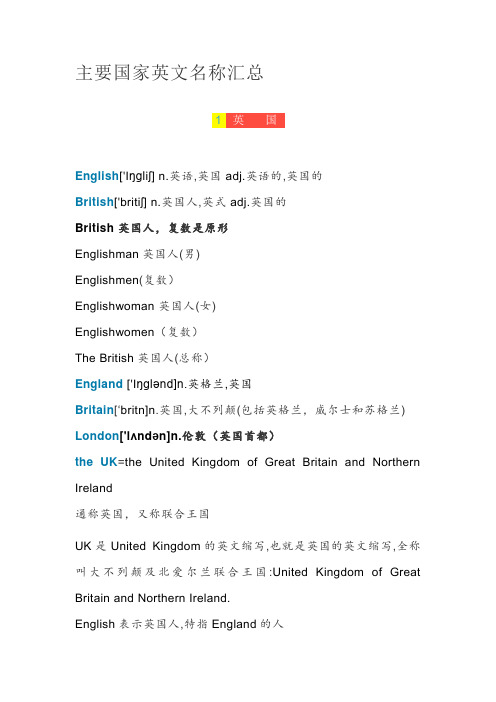
主要国家英文名称汇总1English['Iŋɡl iʃ] n.英语,英国adj.英语的,英国的British['britiʃ] n.英国人,英式adj.英国的British 英国人,复数是原形Englishman英国人(男)Englishmen(复数)Englishwoman 英国人(女)Englishwomen(复数)The British英国人(总称)England ['Iŋɡlənd]n.英格兰,英国Britain[‘britn]n.英国,大不列颠(包括英格兰,威尔士和苏格兰) London['lʌndən]n.伦敦(英国首都)the UK=the United Kingdom of Great Britain and Northern Ireland通称英国,又称联合王国UK是United Kingdom的英文缩写,也就是英国的英文缩写,全称叫大不列颠及北爱尔兰联合王国:United Kingdom of Great Britain and Northern Ireland.English表示英国人,特指England的人British表示英国人,主要指大不列颠Britain的英国人,而Britain是由England,Scotland,North Ireland和Welsh组成的,所以British也用于表示所有英国人British English英式英语American English美式英语2 美国America[ə'merikə] n.美洲,美国American[ə'merikən]adj.美国的,美洲的n.美国人,美洲人。
Americans (复数)The United States of America美利坚合众国即美国的全称,简称U.S.AThe United States 美国,简称U.SWashington['wɒʃIŋtən] n.华盛顿(首都).Amercia 有美国的意思,还有美洲的意思,包括南美洲,北美洲。
常见国家名字基础英语单词

常见国家名字基础英语单词常见国家名字基础英语单词各个国间的'英语名字也是基础英语的学习内容之一,为了帮助大家,店铺整理了关于国家名字的英语单词,希望能帮到大家!欧洲冰岛 Iceland Reykjavik(雷克雅未克)法国 France Paris(巴黎)芬兰 Finland Helsinki(赫尔辛基)捷克 Czech republic Prague(布拉格)荷兰 Holland Amsterdam(阿姆斯特丹)希腊 Greece Athens(雅典)德国 Germany Berlin(柏林)卢森堡 Luxembourg Luxembourg(卢森堡)保加利亚 Bulgaria Sofia(索非亚)拉脱维亚 Latvia Riga(里加)波兰 Poland Warsaw(华沙)爱沙尼亚 Estonia Tallinn(塔林)奥地利 Austria Wien(维也纳)马耳他 Malta Valletta(瓦莱塔)瑞典 Sweden Stockholm(斯德哥尔摩)挪威 Norway Oslo(奥斯陆)意大利 Italy Roma(罗马)匈牙利 Hungary Budapest(布达佩斯)罗马尼亚 Romania Bucuresti(布加勒斯特)萄葡牙 Portugal Lisbon(里斯本)阿尔巴尼亚 Albania Tirana(地拉那)斯洛伐克 Slovakia Bratislava(布拉迪斯拉发)安道尔 Andorra Andorra la Vella(安道尔城)列支敦士登 Liechtenstein Vaduz(瓦杜兹)圣马力诺 San marino San Marino(圣马力诺)摩尔多瓦 Mo ldova Chisinau(基希讷乌)塞尔维亚和黑山 Belgrade(贝尔格莱德)爱尔兰 Ireland DUBLIN(都柏林)立陶宛 Lithuania VILNIUS(维尔纽斯)俄罗斯Russia Москва(莫斯科)斯洛文尼亚 Slovenia Ljubljana(卢布尔雅那)白俄罗斯 Byelorusian S.S.R Minsk(明斯克)英国 England London(伦敦)波黑 Bosnia and Herzegovina Sarajevo(萨拉热窝)马其顿 Macedonia Skopje(斯科普里)克罗地亚 Croatia Zagreb(萨格勒布)乌克兰 Ukraine KIYV(基辅)西班牙 Spain Madrid(马德里)丹麦 Denmark Copenhagen(哥本哈根)摩那哥 Monaco Monaco(摩纳哥)比利时 Belgium Bruxelles(布鲁塞尔)梵帝冈 Vatican瑞士 Switzerland Bern(伯尔尼)亚洲中国 China Beijing(北京)阿富汗 Afghanistan Kabul(喀布尔)巴勒斯坦 Palestine Jerusalem(耶路撒冷)伊拉克 Iraq BAGHDAD(巴格达)阿联酋 The united arab emirates Abu Dhabi(阿布扎比) 亚美尼亚 armenia Yerevan,Epebah(埃里温)哈萨克斯坦 Kazakstan菲律宾 The Philippines Metro Manila(大马尼拉市)塔克吉斯坦 Tajikistan Dushanbe(杜尚别)老挝 Laos VIENTIANE(万象)黎巴嫩 Lebanon Beirut(贝鲁特)。
英语国家概况(谢福之版)总复习资料
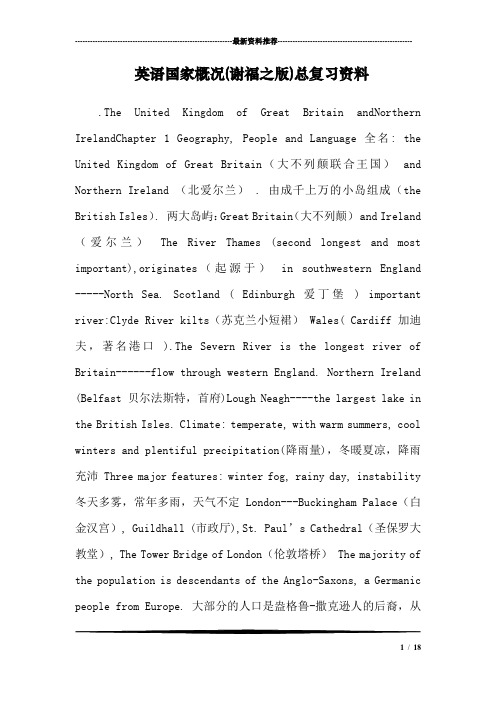
---------------------------------------------------------------最新资料推荐------------------------------------------------------ 英语国家概况(谢福之版)总复习资料.The United Kingdom of Great Britain andNorthern IrelandChapter 1 Geography, People and Language全名: the United Kingdom of Great Britain(大不列颠联合王国)and Northern Ireland (北爱尔兰) . 由成千上万的小岛组成(the British Isles). 两大岛屿:Great Britain(大不列颠) and Ireland (爱尔兰)The River Thames (second longest and most important),originates(起源于)in southwestern England -----North Sea. Scotland ( Edinburgh 爱丁堡) important river:Clyde River kilts(苏克兰小短裙) Wales( Cardiff 加迪夫,著名港口).The Severn River is the longest river of Britain------flow through western England. Northern Ireland (Belfast 贝尔法斯特,首府)Lough Neagh----the largest lake in the British Isles. Climate: temperate, with warm summers, cool winters and plentiful precipitation(降雨量),冬暖夏凉,降雨充沛 Three major features: winter fog, rainy day, instability 冬天多雾,常年多雨,天气不定 London---Buckingham Palace(白金汉宫), Guildhall (市政厅),St. Paul’s Cathedral(圣保罗大教堂), The Tower Bridge of London(伦敦塔桥) The majority of the population is descendants of the Anglo-Saxons, a Germanic people from Europe. 大部分的人口是盎格鲁-撒克逊人的后裔,从1/ 18欧洲来的日耳曼人Most people in Wales and Scotland are descendants of the Celtic people, including the Irish people 威尔士和苏格兰的大多数人都是凯尔特人的后裔,包括爱尔兰人English belongs to the Indo-European family of languages. English is in the Germanic group.英语属于日耳曼语语系Germanic group: East Germanic, North Germanic, West Germanic. English evolved from the West Germanic group.日耳曼语系:东日耳曼语,北日耳曼语,西日耳曼语。
(完整版)世界主要国家英语名称和首都及城市
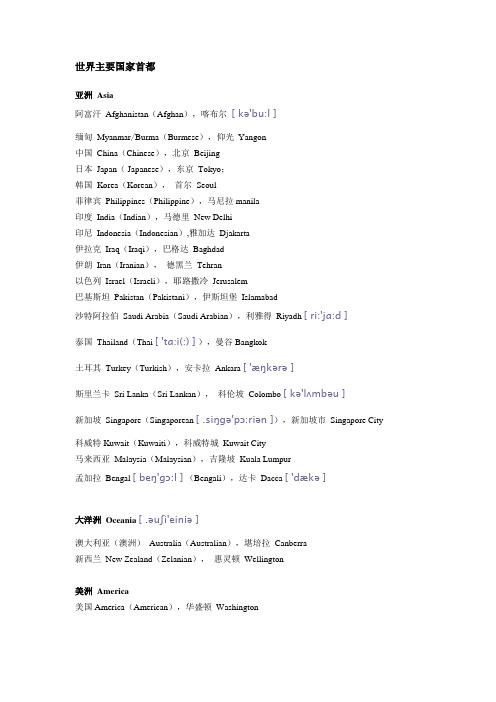
世界主要国家首都亚洲Asia阿富汗Afghanistan(Afghan),喀布尔[ kə'bu:l ]缅甸Myanmar/Burma(Burmese),仰光Yangon中国China(Chinese),北京Beijing日本Japan( Japanese),东京Tokyo;韩国Korea(Korean),首尔Seoul菲律宾Philippines(Philippine),马尼拉manila印度India(Indian),马德里New Delhi印尼Indonesia(Indonesian),雅加达Djakarta伊拉克Iraq(Iraqi),巴格达Baghdad伊朗Iran(Iranian),德黑兰Tehran以色列Israel(Israeli),耶路撒冷Jerusalem巴基斯坦Pakistan(Pakistani),伊斯坦堡Islamabad沙特阿拉伯Saudi Arabia(Saudi Arabian),利雅得Riyadh [ ri:'jɑ:d ]泰国Thailand(Thai [ 'tɑ:i(:) ]),曼谷Bangkok土耳其Turkey(Turkish),安卡拉Ankara [ 'æŋkərə ]斯里兰卡Sri Lanka(Sri Lankan),科伦坡Colombo [ kə'lʌmbəu ]新加坡Singapore(Singaporean [ .siŋgə'pɔ:riən ]),新加坡市Singapore City 科威特Kuwait(Kuwaiti),科威特城Kuwait City马来西亚Malaysia(Malaysian),吉隆坡Kuala Lumpur孟加拉Bengal [ beŋ'gɔ:l ](Bengali),达卡Dacca [ 'dækə ]大洋洲Oceania [ .əuʃi'einiə ]澳大利亚(澳洲)Australia(Australian),堪培拉Canberra新西兰New Zealand(Zelanian),惠灵顿Wellington美洲America美国America(American),华盛顿Washington加拿大Canada(Canadian),渥太华Ottawa [ 'ɔtəwə ]墨西哥Mexico(Mexican),墨西哥市Mexico City巴西Brazil(Brazilian),巴西利亚Brasilia古巴Cuba [ 'kju:bə ](Cuban),哈瓦那Havana [ hə'vænə ]阿根廷Argentina(Argentinian),布宜诺斯艾利斯Buenos Aires欧洲Europe英国England /United Kingdom(English),伦敦London法国France (French),巴黎Paris德国Germany(German),柏林Berlin意大利Italy(Italian),罗马Roman瑞士Switzerland(Swiss),伯尔尼Bern西班牙Spain(Spanish),马德里Madrid葡萄牙Portugal(Portuguese [ .pɔ:tju'gi:z ]),里斯本Lisbon [ 'lizbən ]比利时Belgium [ 'beldʒəm ](Belgian),布鲁塞尔Brussels [ 'brʌslz ]荷兰Netherlands [ 'neðələndz ]/Holand(Dutch[ 'dʌtʃ ]),阿姆斯特丹Amsterdam 希腊Greece(Greek),雅典Athens奥地利Austria [ 'ɔ:striə ](Austrian),维也纳Vienna [ vi'enə ]挪威Norway(Norwegian [ nɔ:'wi:dʒən ]),奥斯陆Oslo [ 'ɔzləu ]捷克共和国Czech Republic/Czech [ tʃek ],布拉格Prague [ prɑ:g ]摩纳哥Monaco [ 'mɔnəkəu ](Monacan),摩纳哥城Monaco City丹麦Denmark(Danish [ 'deiniʃ ]),哥本哈根Copenhagen [ .kəupən'heigən ]芬兰Finland(Finnish),赫尔辛基Helsinki [ 'helsiŋki ]瑞典Sweden [ 'swi:dn ](Swedish),斯德哥尔摩Stockholm [ 'stɔkhəum ]冰岛Iceland/Icelandic,雷克雅未克Reykjavik [ 'reikjəˌvi:k ]俄罗斯Russia (Russian),莫斯科Moscow波兰Poland(Polish),华沙Warsaw匈牙利Hungary [ 'hʌŋgəri ](Hungarian [ hʌŋ'gɛəriən ]),布达佩斯Budapest [ .bu:də'pest ]爱尔兰Ireland(Irish [ 'aiəriʃ ]),都柏林Dublin [ 'dʌblin ]非洲Africa尼日利亚Nigeria [ nai'dʒiəriə ](Nigerian),尼亚美Niamey [ .nja:'mei ]埃及Egypt(Egyptian),开罗Cairo [ 'kaiərəu ]埃塞俄比亚Ethiopia(Ethiopian),亚的斯亚贝巴Addis Ababa [ 'ædis'æbəbə ]马达加斯加Madagascar [ mædə'gæskə ](Malagasy [ .mælə'gæsi ]),南非South Africa(South African),比勒陀利亚Pretoria [ pri'tɔ:riə ]七大洲四大洋亚洲:Asia欧洲:Europe非洲:Africa拉丁美洲:Latin America/South America北美洲:North America大洋洲:Oceania南极洲:Antarctica大西洋:Atlantic Ocean太平洋:Pacific Ocean印度洋:Indian Ocean北冰洋:Arctic Ocean世界主要国家,城市中英文名称及音标Afghanistan[aef'gaenistaen] 阿富汗Africa['aefrikc] 非洲African['aefrikcn] 非洲的;非洲人(the)Antarctic [aen'ta:ktik] 南极地区南极地区的(the)Arctic['a:ktik] 北极地区北极地区的Argentina[,a:d3cn'ti:nc] 阿根廷Argentinian[,a:d3cn'tinicn] 阿根廷的;阿根廷人Buenos Aires[,bwencs'aicriz]布宜诺斯艾利斯(阿首都)Asia['ei$c] 亚洲Asian['ei$n] 亚洲的;亚洲人Australia[o:'streilic] 澳大利亚Australian[o:'streilicn] 澳大利亚的;澳大利亚人Canberra['kaenbcrc]堪培拉(澳首都)Melbourne['melbcn]墨尔本Sydney['sidni]悉尼Austria['o:stric]奥地利Austrian['o:stricn]奥地利的;奥地利人;vienna[vi'enc]维也纳(奥首都)Belgium['beld3cm]比利时Belgian['beld3cn]比利时的;比利时人Bermuda[bc'mju:dc]百慕大Brazil[brc'zil]巴西Brazilian[brc'zilicn]巴西的;巴西人;Bulgaria[b^l'gecric] 保加利亚Cambodia[kaem'bcudic]柬埔寨Canada['kaencdc]加拿大Canadian[kc'neidicn]加拿大的Ottawa['otcwc]渥太华(加首都)Montreal[,montri:'o:l]蒙特利尔Toronto[tc'rontcu]多伦多Vancouver[vaen'ku:vc]温哥华(the People's Republic of)China['pi:plz ri,p^blik cv 't$ainc] 中国Colombia[kc'lombic]哥伦比亚Colombian[kc'lombicn]哥伦比亚[的|人] Bogota[,bcugc'ta:]波哥大Cubapkju:bc]古巴Cuban['kju:bcn]古巴[的|人]Denmark['denma:k]丹麦Copenhagen[,kcupcn'heigcn]哥本哈根(丹首都)Egypt['i:d3ipt]埃及Egyptian[i'd3ip$n]埃及[的|人Cairo['kaicrcu]开罗(埃首都)Alexandria[,aelig'za:ndric]亚历山大England['iyglcnd] 英格兰English['iygli$]英格兰的Englishman['iygli$mcn] Englishwoman['iygli$wumcn] Manchester['maet$istc]曼彻斯特(英国)Liverpool['livcpu:l]利物浦Europe['jucrcp]欧洲European[,jucrc'picn]欧洲[的|人]Finland ['finlcnd]芬兰Finnish[fini$]芬兰的Finn[fin]芬兰人France[fraens]法国French[frent$]法国的;Frenchman['frent$mcn] Frenchwoman['frent$wumcn] Paris['paeris]巴黎Lyon[ljuy]里昂(法国)Marseille[ma:'sei]马赛(法国)(Federal Repblic of) Germany [(,fedcrcl ri,p^blik cv) 'd3c:mcni]德意志联邦共和国German ['d3c:mcn]德国[的|人] Bonn[bon]波恩(德首都)Berlin[bc:'lin]柏林(德)hamburg['haembc:g]汉堡(德)Munich['mju:nik]慕尼黑(德)Cologne[kc'lcun]科隆(德)Great Britain [,greit 'britn]英国British ['briti$]英国的Britisher['briti$c(r)]英国人Greece[gri:s]希腊Greek[gr:k]希腊[的|人]Holland['holcnd]荷兰Dutch[d^t$]荷兰的Dutchman['d^t$mcn] Dutchwoman['d^t$wumcn]荷兰人India['indic]印度Indian['indicn]印度[的|人]New Delhi['nju:'deli]新德里(印首都)Bombay[,bom'bei]孟买Indonesia[,indc'ni:zic]美音为[,indc'ni:3c]印度尼西亚Indonesian[,indc'ni:zicn]美音为[,indc'ni:3n]印度尼西亚[的|人]Djakarta[d3c'ka:tc]雅加达(印首都)Bandung['ba:nduy]万隆Iran[i'ra:n]旧作Persia伊朗Iranian[i'reinicn]伊朗[的|人]Teheran['tehc'raen]德黑兰(伊首都)Iraq[i'ra:k]伊拉克Iraqi[i'ra:ki]伊拉克[的|人]Baghdad['baegdaed]巴格达Ireland['aiclcnd]爱尔兰Irish['aicri$]爱尔兰的Irishman Irishwoman爱尔兰人Israel['izreil]以色列Israeli[iz'reili]以色列[的|人]Italy['itcli]意大利Italian[i'taelicn]意大利[的|人]Rome[rcum]罗马(意首都)Milan[mi'laen]米兰(意)Florence['florcns]佛罗伦萨(意)Venice['venis]威尼斯(意)Turin['tjucrin]都灵(意)Japan['d3c'paen]日本Japanese[,d3aepc'ni:z]日本[的|人]Tokyo['tcukjcu]东京(日首都)Yokohama[jcukc'ha:mc]横滨Nagoya['na:go:'ja:]名古屋Osaka[cu'sa:kc]大阪Kobe['kcubi]神户Hiroshima[,hirc'$i:mc]广岛Sapporo['sa:pcurcu]札幌Java['d3a:vc]爪哇Korea[kc'ric]朝鲜韩国Korean[kc'ricn]朝鲜[的|人]The Democratic People's Republic of Korea 朝鲜民主主义共和国The Republic of Korea大韩民国Pyongyang['pjay'joy]平壤(北朝首都)Seoul[scul]汉城(韩首都)Kuwait[ku'wait]科威特Kuwaiti[ku'waiti]科威特[的|人]Malaysia[mc'lei3c]马来西亚Malaysian[mc'lei3n]马来西亚[的|人] Kuala Lumpur['kwa:lc 'lumpuc]吉隆坡(马首都)Mexico ['meksikcu]墨西哥Mexican['meksikcn]墨西哥[的|人] Mexico City['meksikcu 'siti]墨西哥城(墨西哥合众国首都) (the) Middle East[,midi 'i:st]中东地区Mongolia[moy'gculic]蒙古Mongolian[moy'gculicn]蒙古的Mongol['moygl]蒙古[的|人]Ulan Bator['u:la:n 'ba:to:]乌兰巴托(蒙首都)New Zealand[,nju: 'zi:lcnd] 美音为[,nu: 'zi:lcnd]新西兰Wellington['weliytcn]惠灵顿(新)Norway['no:wei]挪威Pakistan[,pa:ki'sta:n]巴基斯坦Palestine['paelcstain]巴勒斯坦Panama['paencma:]巴拿马Peru[pc'ru:]秘鲁(the)Philippines['filipi:nz]菲律宾Manila[mc'nilc]马尼拉(菲首都)Poland['pculcnd]波兰Warsaw['wo:so:]华沙(波首都)Romania[ru:'meinic]罗马尼亚Russia['r^$c]俄罗斯Moscow['moskcu]莫斯科(俄首都)Saudi Arabia[,saudi c'reibic]沙特阿拉伯Saudi; Saudi Arabian 的|人Scotland['skotlcnd]苏格兰Singapore[,siyc'po:(r)]新加坡Singaporean[,siyc'po:ricn]新加坡[的|人] Somalia[sc'ma:lic]索马里Somali[sc'ma:li]索马里[的|人]South Africa [,sau0 'aefrikc] 南非South Arifcan[,sau0 'aefrikcn]南非[的|人]Spain[spein]西班牙Spanish['spaeni$]西班牙的Spaniard['spaenicd]西班牙人Madrid[mc'drid]马德里(西首都)Sweden['swi:dn]瑞典Swedish['swi:di$]瑞典的Swede[swi:d]瑞典人Switzerland['switsclcnd]瑞士Swiss[swis]瑞士[的|人]Thailand['tailaend]旧作Siam泰国Thai[tai]泰国[的|人]Bangkok[,baey'kok]曼古Turkey['tc:ki]土耳其Turkish['tc:ti$]土耳其的Turk[tc:k]土耳其人(the)United States of America[ju:,naitid ,steits cv c'merikc]美利坚共和国American[c'merikcn]美国[的|人]Miami[mai'aemi]迈阿密Philadelphia[,filc'delfic]费城Philadelphia[,filc'delfic]费城Boston['bostcn]波士顿Pittsburgh['pitsbc:g]匹兹堡Buffalo['b^fclcu]布法罗Detroit[di'troit]底特律Chicago[$i'ka:gcu]芝加哥Atlanta[ct'laentc]亚特兰大St. Louis[snt'luis]圣路易斯Denver['denvc]丹佛Phoenix['fi:niks]菲尼克斯Seattle[si'aetl]西雅图San Francisco[,saenfrcn'siskcu]旧金山(三藩市)Los Angeles[los'aend3ili:z]洛杉叽Vietnam[,vjet'na:m]越南Vietnamese[,vjetnc'mi:z]越南[的|人] Yugoslavia[,ju:gcu'sla:vic]南斯拉夫。
英语国家名称

最佳答案America(美国)American(美国人)American(美国)Australia(澳大利亚)Australian(澳大利亚人)Australian(澳大利亚)Brazil(巴西)Brazilian(巴西人)Brazilian(巴西)Britiain(英国)English(英语)Briton(英国人)British(英国)Canada(加拿大)Canadian (加拿大人)Canadian (加拿大)China(中国)Chinese(汉语)Chinese(中国人)Chinese(中国)Egypt(埃及)Egyptian(埃及人)Egyptian(埃及)England(英国)English(英语)Englishman(英国人)English (英国)France(法国)French(法语)Frenchman(法国人)French(法国)Germany(德国)German(德语)German(德国人)German (德国)Greece(希腊)Greek(希腊语)Greek(希腊人)Greek(希腊)India(印度)Indian(印度人)Indian(印度)Ireland(爱尔兰)Irish(爱尔兰语)Irishman(爱尔兰人)Irish (爱尔兰)Israel(以色列)Israeli(以色列人)Israeli(以色列)Italy(意大利)Italian (意大利语)Italian (意大利人)Italian (意大利)Japan(日本)Japanese(日语)Japanese(日本人)Japanese (日本)The Netherlands(荷兰)Dutch(荷兰语)Dutchman(荷兰人)Dutch(荷兰)New Zealand(新西兰)New Zealander(新西兰)Portugal(葡萄牙)Portuguese(葡萄牙语)Portuguese(葡萄牙人)Portuguese(葡萄牙)Russia(俄国)Russian(俄语)Russian(俄国人)Russian(俄国)Scotland(苏格兰)Scots,Scottish(苏格兰语)Scotsman (苏格兰人)Scots,Scottish(苏格兰)Spain(西班牙)Spanish(西班牙语)Spaniard(西班牙人)Spanish (西班牙)Sweden(瑞典)Swedish(瑞典语)Swedish(瑞典人)Swedish (瑞典)Switzerland(瑞士) Swiss(瑞士人)Swiss(瑞士)Wales(威尔士)Welsh(威尔士语)Welshman(威尔士人)Welsh (威尔士)。
初中英语常见国家的名称、首都和俗称
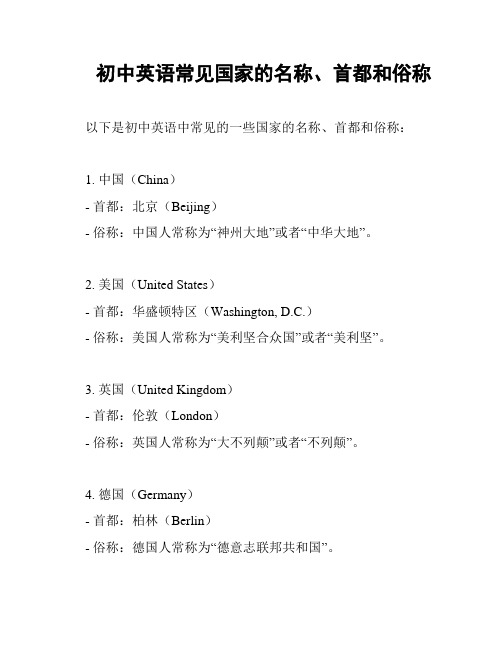
初中英语常见国家的名称、首都和俗称
以下是初中英语中常见的一些国家的名称、首都和俗称:
1. 中国(China)
- 首都:北京(Beijing)
- 俗称:中国人常称为“神州大地”或者“中华大地”。
2. 美国(United States)
- 首都:华盛顿特区(Washington, D.C.)
- 俗称:美国人常称为“美利坚合众国”或者“美利坚”。
3. 英国(United Kingdom)
- 首都:伦敦(London)
- 俗称:英国人常称为“大不列颠”或者“不列颠”。
4. 德国(Germany)
- 首都:柏林(Berlin)
- 俗称:德国人常称为“德意志联邦共和国”。
5. 法国(France)
- 首都:巴黎(Paris)
- 俗称:法国人常称为“法兰西”。
6. 俄罗斯(Russia)
- 首都:莫斯科(Moscow)
- 俗称:俄罗斯人常称为“大俄罗斯”。
7. 澳大利亚(Australia)
- 首都:堪培拉(Canberra)
- 俗称:澳大利亚人常称为“澳洲”。
请注意,这只是初中英语中常见国家的一些基本信息,其他国家和地区的名称、首都和俗称还有很多,如果需要更详细的信息,建议查阅专业的地理书籍或参考可靠的资料来源。
国家名字 英语

亚洲Asia阿富汗Afghanistan 喀布尔Kabul缅甸Burma 仰光Rangoon [ræŋˈɡu:n]日本Japan 东京Tokyo韩国Korea 汉城Seoul [səul]菲律宾Philippines 奎松城Quezon [ˈkeizɔn]也门Yemen 萨那San'a印度India 马德里New Delhi印尼Indonesia 雅加达Djakarta [dʒəˈkɑ:tə]伊拉克Iraq 巴格达Baghdad [ˈbæɡdæd]老挝Laos 万象Vientiane伊朗Iran 德黑兰Tehran /teəˈræn/以色列Israel 耶路撒冷Jerusalem巴基斯坦Pakistan 伊斯坦堡Islamabad黎巴嫩Lebanon 贝鲁特Beirut沙特阿拉伯Saudi Arabia 利雅得Riyadh叙利亚Syria 大马士革Damascus泰国Thailand 曼谷Bangkok土耳其Turkey 安卡拉Ankara约旦Jordan 安曼Amman斯里兰卡Sri Lanka 科伦坡Colombo新加坡Singapore 新加坡市Singapore City科威特Kuwait 科威特城Kuwait City尼泊尔Nepal 加德满都Kathmandu马来西亚Malaysia 吉隆坡Kuala Lumpur孟加拉Bengal 达卡Dacca阿曼Oman 马斯喀特Muscat巴林Bahrain (-rein) 麦纳麦Manama卡塔尔Qatar 多哈Doha阿拉伯联合酋长国The United Arab Emirates 阿布扎比Abu Dhabi 马尔代夫Maldives 马累Male不丹Bhutan 廷布Thimphu大洋洲Oceania澳大利亚(澳洲)Australia 堪培拉Canberra新西兰New Zealand 惠灵顿Wellington瑙鲁Nauru 亚伦区Yaren District汤加The Kingdom of Tonga 努库阿洛法Nukualofa斐济Fiji 苏瓦Suva美洲America美国the United States of America 华盛顿Washington加拿大Canada 渥太华Ottawa墨西哥Mexico 墨西哥市Mexico City萨尔瓦多El Salvador 圣萨尔瓦多San Salvador 哥斯达黎加Costa Rica 圣何塞San Jose多米尼加Dominican 圣多明各Santo Domingo 委内瑞拉Venezuela 加拉加斯Caracas洪都拉斯Honduras 特古西加尔巴Tegucigalpa 尼加拉瓜Nicaragua 马那瓜Managua巴西Brazil 巴西利亚Brasilia巴拉圭Paraguay 亚松森Asuncion巴拿马Panama 巴拿马城Panama City厄瓜多尔Ecuador 基多Quito古巴Cuba 哈瓦那Havana哥伦比亚Colombia 波哥大Bogota海地Haiti 太子港Port-au-Prince牙买加Jamaica 金斯敦Kingston阿根廷Argentina 布宜诺斯艾利斯Buenos Aires 智利Chile 圣地亚哥Santiago秘鲁Peru 利马Lima玻利维亚Bolivia 苏克雷Sucre乌拉圭Uruguay 蒙得维的亚Montevideo巴哈马Bahamas 拿骚Nassau波多黎各Puerto Rico 圣胡安San Juan欧洲Europe英国United Kingdom 伦敦London法国France 巴黎Paris德国Germany 柏林Berlin意大利Italy 罗马Roman梵蒂冈Vatican 梵蒂冈市Vatican City瑞士Switzerland 伯尔尼Bern西班牙Spain 马德里Madrid葡萄牙Portugal 里斯本Lisbon比利时Belgium 布鲁塞尔Brussels荷兰Netherlands 阿姆斯特丹Amsterdam卢森堡Luxemburg 卢森堡Luxemburg希腊Greece 雅典Athens圣马力诺San Marino 圣马力诺城San Marino 列支敦士登Liechtenstein 瓦杜兹Vaduz奥地利Austria 维也纳Vienna, Wien安道尔Andorra 安道尔城Andorra la Vella挪威Norway 奥斯陆Oslo捷克共和国Czech Republic 布拉格Prague摩纳哥Monaco 摩纳哥城Monaco City南斯拉夫Yugoslavia 贝尔格莱德Belgrade马耳他Malta 瓦莱塔Valletta丹麦Denmark 哥本哈根Copenhagen芬兰Finland 赫尔辛基Helsinki瑞典Sweden 斯德哥尔摩Stockholm冰岛Iceland 雷克雅未克Reykjavik俄罗斯Russia 莫斯科Moscow波兰Poland 华沙Warsaw匈牙利Hungary 布达佩斯Budapest罗马尼亚Rumania 布加勒斯特Bucharest保加利亚Bulgaria 索非亚Sofia阿尔巴尼亚Albania 地拉那Tirane爱尔兰Ireland 都柏林Dublin非洲Africa多哥Togo 洛美Lome赞比亚Zambia 卢萨卡Lusaka尼日尔Niger 尼亚美Niamey几内亚Guinea 科纳克里Conakry摩洛哥Morocco 拉巴特Rabat斯威士兰Swaziland 姆巴巴纳Mbabane埃及Egypt 开罗Cairo利比亚Libya 的黎波里Tripoli突尼斯Tunisia 突尼斯Tunis阿尔及利亚Algeria 阿尔及尔Algiers苏丹Sudan 喀土穆Khartoum布基纳法索Burkina Faso 瓦加杜古Ouagadougou 埃塞俄比亚Ethiopia 亚的斯亚贝巴Addis Ababa 索马里Somalia 摩加迪沙Mogadishu塞内加尔Senegal 达喀尔Dakar马里Mali 巴马科Bamako冈比亚Gambia 班珠尔Banjul毛里塔尼亚Mauritania 努瓦克肖特Nouakchott加纳Ghana 阿克拉Accra喀麦隆Cameroun 雅温得Yaounde中非Central Africa 班吉Bangui刚果Congo 布拉柴维尔Brazzaville加蓬Gabon 利伯维尔Libreville卢旺达Rwanda 基加利Kigali布隆迪Burundi 布琼布拉Bujumbura马拉维Malawi 利隆圭Lilongwe博茨瓦纳Botswana 哈博罗内Gaborone莱索托Lesotho 马塞卢Maseru肯尼亚Kenya 内罗比Nairobi乌干达Uganda 坎帕拉Kampala马达加斯加Madagascar 塔那那列佛Antananarivo坦桑尼亚Tanzania 达累斯萨拉姆Dar es Salaam 南非South Africa 比勒陀利亚Pretoria几内亚比绍Guinea-Bissau 比绍Bissau莫桑比克Mozambique 马普托Maputo。
英语基础常用的外国国家名以及主要城市名字,主语,宾语,形容性物主代词,名词性物主代词
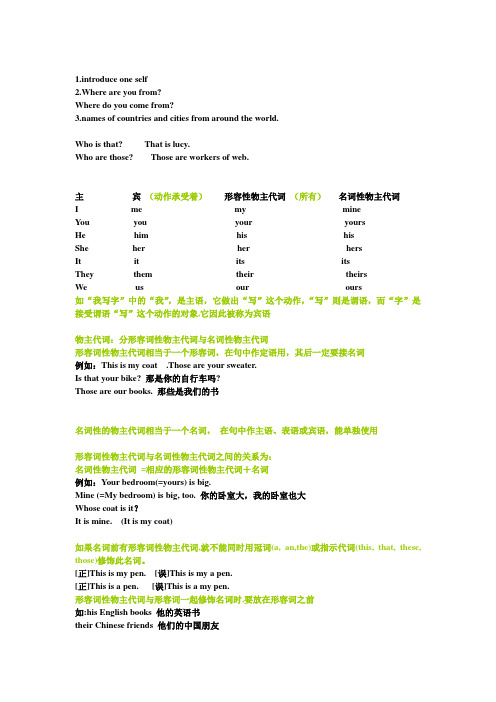
1.introduce one self2.Where are you from?Where do you come from?s of countries and cities from around the world.Who is that? That is lucy.Who are those? Those are workers of web.主宾(动作承受着)形容性物主代词(所有)名词性物主代词I me my mineYou you your yoursHe him his hisShe her her hersIt it its itsThey them their theirsWe us our ours如“我写字”中的“我”,是主语,它做出“写”这个动作,“写”则是谓语,而“字”是接受谓语“写”这个动作的对象,它因此被称为宾语物主代词:分形容词性物主代词与名词性物主代词形容词性物主代词相当于一个形容词,在句中作定语用,其后一定要接名词例如:This is my coat .Those are your sweater.Is that your bike? 那是你的自行车吗?Those are our books. 那些是我们的书名词性的物主代词相当于一个名词,在句中作主语、表语或宾语,能单独使用形容词性物主代词与名词性物主代词之间的关系为:名词性物主代词=相应的形容词性物主代词+名词例如:Your bedroom(=yours) is big.Mine (=My bedroom) is big, too. 你的卧室大,我的卧室也大Whose coat is it?It is mine. (It is my coat)如果名词前有形容词性物主代词,就不能同时用冠词(a, an,the)或指示代词(this, that, these, those)修饰此名词。
[正]This is my pen. [误]This is my a pen.[正]This is a pen. [误]This is a my pen.形容词性物主代词与形容词一起修饰名词时,要放在形容词之前如:his English books 他的英语书their Chinese friends 他们的中国朋友I like him. His name is mike.Your pen is white. Mine pen is white.1.My favorite day is Wednesday.2.Your apple is red. Mine is green.3.Where are they from?4.Our notebook is over there.5.What are their names?6.I beat her. (beat是动词,后面要加人称代词的宾格)7.Its name is cat. It is my cat.Which city isn’t in England?They come from same country.Do they come from same country?What is the country in the middle?The person on the left is a man.Here are three people.My name is (be) _______.I am from china.I come from china.They come from china.She comes from china. (第三人称+S)Which city are you from?I am from________?Where is she from ?Where does she come from ?She is from_______.She comes from________.Does he come from china?Yes , he does.The united[jʊ'naɪtɪd] states[steɪts] U.S. America[ə'merikə]美国American [ə'merikən]美国人New york纽约washington['wɔʃiŋtən] D.C.华盛顿Chicago[ʃi'kɑ:ɡəu]芝加哥Los[lɔ:s] angeles[ændʒələs]洛杉矶philadelphia[filə'delfjə]费城boston['bɔstən]波士顿San francisco[fræn'siskəu]旧金山houston['hju:stən]休斯顿atlanta[ət'læntə]亚特兰大Britain['brɪt(ə)n]the United kingdom['kɪŋdəm]英国British ['brɪtɪʃ]英国人London['lʌndən]伦敦birmingham['bə:miŋəm]伯明翰bristol ['brɪstl]布里托斯leeds[li:dz]利兹Liverpool ['livəpu:l]利物浦manchester ['mæntʃɪstə]曼彻斯特newcastle ['nu,kæsəl]纽卡斯尔Nottingham ['nɔtiŋəm]诺丁汉sheffield['ʃefi:ld]谢菲尔德edinburgh['edinbərə]爱丁堡Glasgow ['ɡlɑ:sɡəu]格拉斯哥Cardiff['kɑ:dif]卡迪夫Belfast[bel'fɑ:st]贝尔法斯特Cambridge['keimbridʒ]剑桥Oxford ['ɒksfəd]牛津Portsmouth ['pɔ:tsməθ]朴茨茅斯righton['braɪtən]布莱顿Bath[bɑːθ]巴斯Exeter ['eksitə]埃克塞特Southampton[sau'θæmptən]南安普敦France [frɑːns]法国French [fren(t)ʃ]法国人Paris['pærɪs]巴黎Dunkerque['dʌnkə:k]敦刻尔克Lille['li:l]里尔Cherbourg['ʃεəbuəɡ]瑟堡Rouen [ru:'ɔŋ]鲁昂Nancy['nænsɪ]兰斯Brest[brest]布雷斯特Strasbourg ['stæsbə:ɡ]斯特拉斯堡Orleans [ɔ:'liənz]奥尔良) Nantes [nænts]南特Dijon [di'ʒuŋ]第戎Limoges[lɪ'moʒ]里摩日Lyon[ljuŋ]里昂Grenoble[ɡrə'nəubl]格勒诺布尔Bordeaux [bɔ:'dəu]波尔多Valence ['veləns]瓦朗斯Toulouse[tu:'lu:z ]图卢兹Nice[naɪs]尼斯Perpignan[pεəpi:'njã]佩皮尼昂Marseille [ma:'seil]马赛Toulon [tu:'ləun]土伦Mexico['meksikəu]墨西哥Mexican ['mɛksɪkən]墨西哥人India['ɪndɪə]印度Mumbai [mʌm'bai]孟买delhi['deli]德里Canada ['kænədə]加拿大Canadian [kə'nedɪən]加拿大人Spain[spein]西班牙spanish['spænɪʃ]西班牙人Japan[dʒə'pæn]日本japanese[dʒæpə'ni:z]日本人Tokyo ['təukjəu] 东京Hokkaido [hɔ'kaidəu] 北海道Nara [nɑ:'rɑ:]奈良Osaka [əu'sɑ:kə]大阪Yokohama [jəukə'hɑ:mə]横滨Nagoya ['nɑ:ɡɔ:'jɑ:] 名古屋Kyoto [ki'əutəu]京都Kobe ['kəubi]神户Kitakyushu ['kitɑ:'kju:ʃju:] 北九州Sapporo ['sɑ:pəurəu]札幌Kawasaki [,kɑ:wə'sɑki]川崎Fukuoka ['fu:ku:'əukə]福冈Korea [kə'riə]韩国Korean[kə'riən]韩国人Seoul [səul]汉城/首尔(首都)Pusan ['pu:'sɑ:n] 釜山Taegu ['taiɡu:]大丘Inchon ['in'tʃɔn]仁川Kwangju ['ɡwɑ:ŋ'dʒu:]光州Taejon['taidʒɔn]大邱亚洲:Asia ['eiʃə]欧洲:Europe ['juərəp]非洲:Africa ['æfrikə]拉丁美洲:Latin ['lætɪn] America [ə'merikə] /South [saʊθ] America北美洲:North [nɔ:θ]America 大洋洲:Oceania [əʊsɪ'ɑːnɪə]南极洲:Antarctica [ænt'ɑ:ktikə]大西洋:Atlantic [æt'læntɪk] Ocean ['əʊʃ(ə)n]太平洋:Pacific [pə'sɪfɪk] Ocean印度洋:Indian ['ɪndɪən] Ocean 北冰洋:Arctic ['ɑːktɪk] Ocean1. take about oneself,the details and spelling['spelɪŋ], of his/hername,age,family,relationships[rɪ'leɪʃ(ə)nʃɪp].2. ability[ə'bɪlɪtɪ]3. ask for time, direction[dɪ'rekʃ(ə)n],suggestion[sə'dʒestʃ(ə)n]There are three people in my family.Is she from france ? She is from france.Does she come from france? She comes from france.谓语动词往往需要形式变化,在一般现在时中,主语是第三人称单数时,肯定句中谓语从此要用-S形式,疑问句是在句首加Does,第三人称已经通过does体现出人称的变化,所以动词要用动词的原型,不能再用动词的-S形式。
国家名称英语
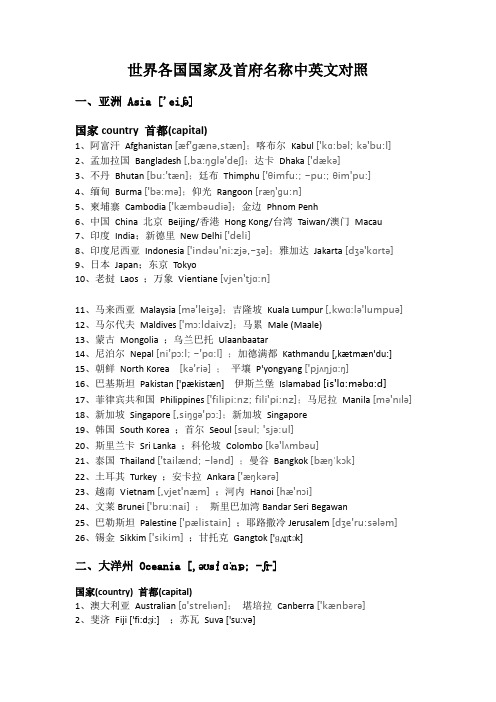
世界各国国家及首府名称中英文对照一、亚洲 Asia ['eiʃə]国家country 首都(capital)1、阿富汗Afghanistan [æf'gænə,stæn];喀布尔Kabul ['kɑ:bəl; kə'bu:l]2、孟加拉国Bangladesh [,ba:ŋglə'deʃ];达卡Dhaka ['dækə]3、不丹Bhutan [bu:'tæn];廷布Thimphu ['θimfu:; -pu:; θim'pu:]4、缅甸Burma ['bə:mə];仰光Rangoon [ræŋ'ɡu:n]5、柬埔寨Cambodia ['kæmbəudiə];金边Phnom Penh6、中国China 北京Beijing/香港Hong Kong/台湾Taiwan/澳门Macau7、印度India;新德里New Delhi ['deli]8、印度尼西亚Indonesia ['indəu'ni:zjə,-ʒə];雅加达Jakarta [dʒə'kɑrtə]9、日本Japan;东京Tokyo10、老挝Laos ;万象Vientiane [vjen'tjɑ:n]11、马来西亚Malaysia [mə'leiʒə];吉隆坡Kuala Lumpur [,kwɑ:lə'lumpuə]12、马尔代夫Maldives ['mɔ:ldaivz];马累Male (Maale)13、蒙古Mongolia ;乌兰巴托Ulaanbaatar14、尼泊尔Nepal [ni'pɔ:l; -'pɑ:l] ;加德满都Kathmandu [,kætmæn'du:]15、朝鲜North Korea [kə'riə] ;平壤P'yongyang ['pjʌŋjɑ:ŋ]16、巴基斯坦Pakistan ['pækistæn] 伊斯兰堡Islamabad [is'lɑ:məbɑ:d]17、菲律宾共和国Philippines ['filipi:nz; fili'pi:nz];马尼拉Manila [mə'nɪlə]18、新加坡Singapore [,siŋɡə'pɔ:];新加坡Singapore19、韩国South Korea ;首尔Seoul [səul; 'sjə:ul]20、斯里兰卡Sri Lanka ;科伦坡Colombo [kə'lʌmbəu]21、泰国Thailand ['tailænd; -lənd] ;曼谷Bangkok [bæŋˈkɔk]22、土耳其Turkey ;安卡拉Ankara ['æŋkərə]23、越南Vietnam [,vjet'næm];河内Hanoi [hæ'nɔi]24、文莱Brunei ['bru:nai] ;斯里巴加湾Bandar Seri Begawan25、巴勒斯坦Palestine ['pælistain];耶路撒冷Jerusalem [dʒe'ru:sələm]26、锡金Sikkim ['sikim];甘托克Gangtok ['ɡʌŋtɔk]二、大洋州 Oceania [,əʊsɪ'ɑːnɪə; -ʃɪ-]国家(country) 首都(capital)1、澳大利亚Australian [ɑ'strelɪən];堪培拉Canberra ['kænbərə]2、斐济Fiji ['fi:dʒi:] ;苏瓦Suva ['su:və]3、基里巴斯Kiribati ['kiribæs];塔拉瓦Tarawa [tə'rɑ:wə; tɑ:'rɑ:wɑ:;]4、瑙鲁Nauru [nɑ:'u:ru:];亚伦Yaren ['ja:rən]5、新西兰New Zealand ;惠灵顿Wellington ['welɪŋtən]6、巴布亚新几内亚Papua['pæpjuə] New guinea['gɪnɪ];莫尔兹比Port Moresby7、所罗门群岛Salomonen ;霍尼亚拉Honiara [,həuni'ɑ:rə]8、汤加Tonga ['tɒŋgə] 努库阿洛法;Nukualofa [,nu:ku:ə'lɔ:fə]9、瓦努阿图Vanuatu [,vɑ:nu:'ɑ:tu:];维拉港Vila ['vilə]10、西萨摩亚 West Samoa[sə'məuə] ;阿皮亚 Apia [ə'pi:ə]三、欧洲 Europe ['juərəp]国家(coutry) 首都名称(capital)1、阿尔巴尼亚Albania [æl'beiniə];地拉那Tirana [ti'rɑ:nə; ti:'rɑ:nɑ:]2、奥地利Austria ['ɔstriə];维也纳Vienna [vɪ'ɛnə]3、比利时Belgium ['beldʒəm];布鲁塞尔Brussels ['brʌsəlz]4、保加利亚Bulgaria [bʌl'ɡεəriə];索非亚Sofia ['səufiə; səu'fi:ə]5、克罗地亚Croatia[krəu'eiʃjə];萨格勒布Zagreb ['zɑ:ɡreb]6、塞浦路斯Cyprus ['saiprəs];尼克西亚Nicosia [,nikəu'si:ə]7、丹麦Denmark ['denma:k];哥本哈根Copenhagen [,kəupən'heiɡən]8、芬兰Finland ['finlənd] ;赫尔辛基Helsinki ['helsiŋki]9、法国France ;巴黎Paris ['pærɪs]10、德国Germany ;柏林Berlin [bɝ'lɪn]11、希腊Greece;雅典Athens ['æθɪnz]12、匈牙利Hungary ['hʌŋɡəri];布达佩斯Budapest ['bju:dəpest]13、冰岛Iceland 雷克亚未克;Reykjavik ['reikjəvik; -vi:k]14、爱尔兰Ireland ['aiəland];都柏林Dublin ['dʌblin]15、意大利Italy ['itəli];罗马Rome [rəum]16、列支敦士登Liechtenstein ['li:ʃtənʃtain];瓦杜兹Vaduz ['vɑ:du:ts]17、卢森堡Luxembourg ['lʌksəmbə:ɡ, 'lju:ksɔŋ'bu:r];卢森堡Luxembourg18、马其顿Macedonia [,mæsi'dəunjə];斯科普里Skopje [ 'skɔ:pje]19、马耳他Malta ['mɔ:ltə];瓦莱塔Valletta [vɑ:l'lettɑ:]20、摩纳哥公国The Principality of Monaco [ˈmɔnəkəu] ;摩纳哥Monaco21、荷兰Netherlands ['neðələndz];阿姆斯特丹Amsterdam [,æmstə'dæm]22、挪威Norway ['nɔ:wei];奥斯陆Oslo ['ɔzləu; 'uslu]23、波兰Poland ['pəulənd];华沙Warsaw ['wɔ:sɔ:]24、葡萄牙Portugal ['pɔ:tjuɡəl];里斯本Lisbon ['lizbən]25、罗马尼亚Romania [rəu'meinjə];布加勒斯特Bucharest ['bju:kərest]26、俄罗斯Russia ['rʌʃə] ;莫斯科Moscow ['mɔskəu]27、圣马利诺San Marino ;圣马力诺San Marino28、斯洛文尼亚Slovenia [sləu'vi:niə];卢布尔雅那Ljubljana [lju:'bljɑ:nə]29、西班牙Spain [spein];马德里Madrid [mə'drɪd]30、瑞典Sweden ['swi:dən] ;斯德哥尔摩Stockholm ['stɔkhəum;]31、瑞士Switzerland ['switsələnd];伯尔尼Bern/Berne [bɝn]32、大不列颠联合王国United Kingdom ;伦敦London ['lʌndən]33、南斯拉夫Yugoslavia [,ju:ɡəu'slɑ:viə];贝尔格莱德Belgrade [,bel'ɡreid]四、美洲 America国家(Country) 首都(capital)1、安圭拉岛Anguilla [æŋ'ɡwilə];瓦利The Valley2、安提瓜岛Antigua [æn'ti:ɡwə]and Barbuda[bɑ:'bu:də] ;圣约翰Saint John's3、阿根廷Argentina [,ɑ:dʒən'ti:nə];布宜诺斯艾利斯Buenos Aires4、巴哈马The Bahamas [bə'hɑ:məz];拿索Nassau ['næsɔ:]5、巴巴多斯岛Barbados [bɑ:'beidəuz] ;布里奇顿Bridgetown ['bridʒtaun]6、伯利兹Belize [be'li:z] ;贝尔莫潘Belmopan [,belməu'pæn]7、百慕大群岛Bermuda [bɚ'mjʊdə];哈密尔顿Hamilton ['hæmiltən]8、玻利维亚Bolivia [bə'lɪvɪə];拉巴斯La Paz [lɑ:]9、巴西Brazil [brə'zil];巴西利亚Brasilia [brə'ziliə]10、英属维尔京群岛British Virgin['və:dʒin] Islands ;罗德城Road Town11、加拿大Canada ;温哥华Ottawa ['ɔtəwə]12、智利Chile ['tʃili] ;圣地亚哥Santiago [,sænti:'eiɡəu]13、哥伦比亚Colombia [kə'lʌmbiə];巴哥达Bogota [bəugə'ta]14、哥斯达黎加Costa['kɔstə] Rica ;圣约瑟San Jose15、古巴Cuba ['kju:bə];哈瓦那Havana [hə'vænə]16、多米尼加共和Dominican Republican;圣多明各Santo ['sɑ:ntəu] Domingo17、厄瓜多尔Ecuador ['ekwədɔ:];基多Quito ['ki:təu]18、萨尔瓦多El Salvador [el]['sælvədɔ:] ;圣萨尔瓦多San Salvador19、格陵兰Greenland ;努克Nuuk[nʊək] (戈特霍布Godthab['ɡɔ:thɔ:b])20、格林纳达Grenada [grə'nedə];圣乔治Saint George's21、瓜德罗普岛Guadeloupe ['ɡwɑ:dəlu:p];巴斯特尔Basse-Terre [bæs'teə,]22、危地马拉Guatemala [,ɡwæti'mɑ:lə];危地马拉Guatemala23、圭亚那Guyana [ɡai'ænə];乔治敦Georgetown ['dʒɔ:dʒtaun]24、海地Haiti ['heiti] ;太子港Port-au[əu]-Prince25、洪都拉Honduras [hɔn'djuərəs];特古巴加尔Tegucigalpa [tə'ɡu:si'ɡælpə]26、牙买加Jamaica [dʒə'meikə];金斯敦Kingston ['kɪŋztən]27、马提尼克岛Martinique [,mɑ:ti'ni:k] ;法兰西堡Fort-de-France28、墨西哥Mexico ['meksikəu];墨西哥城Mexico29、蒙特塞拉特岛Montserrat [,mɔntsə'ræt];普利茅斯Plymouth ['pliməθ]30、尼加拉瓜Nicaragua [,nikə'ræɡjuə];马那瓜Managua [mɑ:'nɑ:ɡwɑ:]31、巴拿马Panama ['pænəmɑː; ,pænə'mɑː];巴拿马城Panama32、巴拉圭Paraguay ['pærəɡwai] ;亚松森Asuncion [a:,su:n'sjɔ:n]33、秘鲁Peru [pə'rʊ];利马Lima ['limə]34、波多黎各岛Puerto Rico ['pwə:təu'ri:kəu] ;圣胡安San Juan35、圣卢西亚岛St. Lucia ['lu:sjə] ;卡斯特里Castries [kæ'stri:; 'kɑ:stris]36、圣文森特岛St. Vincent ['vɪnsnt] and the Grenadines;金斯敦Kingstown37、苏里南Suriname ['suərə,nɑ:m];帕拉马里博Paramaribo [,pærə'mæribəu]38、特立尼达和多巴哥Trinidad and Tobago ;西班牙港Port-of-Spain39、特克斯群岛和凯科斯群岛Turks and Caicos Islands;大特克Grand Turk40、美国United States ;华盛顿Washington ['wɔʃiŋtən], DC41、乌拉圭Uruguay ['juərəɡwei];蒙得维的Montevideo42、委内瑞拉Venezuela [,veni'zweilə];加拉加斯Caracas [kə'rækəs]43、美属维尔京群岛Virgin Islands;夏洛特阿马利亚Charlotte ['ʃɑ:lət]Amalie五、非洲 Africa['æfrikə]国家(Country) 首都(capital)1、阿尔及利亚Algeria [æl'dʒiəriə];阿尔及尔Algiers [æl'dʒiərz]2、安哥拉Angola [æŋ'ɡəulə];罗安达Luanda [lu'ændə]4、贝宁Benin [bə'nin; be'ni:n];波多诺夫Porto-Novo ['pɔ:təu'nəuvəu; 'pəu-]4、博茨瓦纳Botswana [bɔ'tswɑ:nə];哈伯罗内Gaborone [,ɡɑ:bə'rəunei]5、布隆迪Burundi [bu'ru:ndi];布琼布拉Bujumbura [,bu:dʒəm'buərə]6、喀麦隆Cameroon [,kæmə'ru:n; 'kæm-];雅温得Yaounde [,jaun'dei]7、中非Central African Republic ;班吉Bangui [bɑ:ŋ'ɡi:]8、乍得Chad [tʃæd];恩贾梅纳N'Djamena9、刚果共和国Congo['kɔŋɡəu] Rep.;布拉柴维尔Brazzaville ['bræzəvil; 'brɑ:-]10、吉布提共和国Djibouti [dʒə'bu:ti];吉布提Djibouti11、埃及Egypt ['i:dʒipt] ;开罗Cairo ['kaiərəu]12、赤道几内亚Equatorial Guinea[,ekwə'tɔ:riəl] ;马拉博Malabo [mə'lɑ:bəu]13、厄立特里亚Eritrea [,eri'triə];阿斯马拉Asmara [æz'mɑ:rə]14、埃塞俄比亚Ethiopia;亚的斯亚贝巴Addis Ababa ['ædis'æbəbə]15、加蓬Gabon ['ædis] ;利伯维尔Libreville ['li:brəvil]16、冈比亚The Gambia ['ɡæmbiə];班珠尔Banjul ['bɑ:ndʒu:l]17、加纳Ghana ['ɡɑ:nə];阿克拉Accra ['ækrə; ə'krɑː]18、几内亚Guinea ['gɪnɪ];科纳克里Conakry ['kɔnə,kri]19、几内亚比绍共和国Guinea-Bissau ['gɪnɪ][bi'sau];比绍Bissau20、肯尼亚Kenya ['kenjə; 'ki:njə];内罗毕Nairobi [naiə'rəubi]21、莱索托Lesotho [lə'səutəu];马塞卢Maseru ['mæzə,ru:]22、利比里亚Liberia [lai'bi:riə];蒙罗维亚Monrovia [mən'rəuviə]23、利比亚Libya ['libiə];的黎波里Tripoli ['trɪpəlɪ]24、马达加斯加Madagascar ;安塔那利佛Antananarivo [,ɑ:ntənɑ:nə'ri:vəu]25、马拉维Malawi [mɑ:'lɑ:wi] ;利隆圭Lilongwe [li'lɔŋwi]26、马里Mali ['mɑ:li] ;巴马科Bamako ['bæməkəu]27、毛里求斯Mauritius [mɔ:'riʃiəs] ;路易港Port Louis ['luːɪ]28、毛里塔尼亚Mauritania [,mɔri'teiniə] ;努瓦克肖特Nouakchott [nwɑ:k'ʃɔt]29、摩洛哥Morocco [mə'rɒkəʊ] ;拉巴特Rabat [rə'bæt]30、莫桑比克Mozambique [,məuzəm'bi:k] ;马普托Maputo [mə'pu:təu]31、纳米比亚Namibia [nɑ:'mibiə];温得和克Windhoek ['vinthuk]32、尼日尔Niger ['naidʒə] ;尼亚美Niamey [njɑ:'mei]33、尼日利亚Nigeria [nai'dʒiəriə] ;拉各斯Abuja [a:'bu:dʒa:]34、留尼旺岛Reunion [,ri:'ju:njən] ;圣但尼Saint-Denis35、刚果民主共和国Republic of the Congo;金沙萨Kinshasa [kin'ʃɑ:sə]36、卢旺达Rwanda [ru'ændə] ;基加利Kigali [ki'ɡɑ:li]37、圣多美及普林西比民主共和国Sao Tomeand Principe;圣多美Sao Tome38、塞内加尔Senegal [,senə'ɡɔ:l];达喀尔Dakar [də'kɑ:]39、塞舌尔Seychelles [sei'ʃelz];维多利亚Victoria [vɪk'tɔːrɪə]40、塞拉里昂Sierra Leone ['siərə li:'əun];弗里敦Freetown ['fri:taun]41、索马里Somalia [səu'mɑ:liə; -ljə] ;摩加迪沙Mogadishu [,mɔgə'diʃu:]42、南非South Africa ;比勒陀利亚(行政首都)Pretoria [pri:'tɔ:ri:ə]43、开普敦(立法首都)Cape Town;布隆方丹(司法首都)Bloemfontein44、苏丹Sudan [su:'dæn] ;喀土穆Khartoum [ka:'tu:m]45、斯威士兰Swaziland ['swɑ:zilænd] ;姆巴巴内Mbabane [əmbɑ:'bɑ:ni]46、坦桑尼亚Tanzania [,tænzə'niə;] ;达累斯萨拉姆Dar es [i:z; es] Salaam47、多哥Togo [' təuɡəu] ;洛美Lome48、突尼斯Tunisia[tju:'niziə; -siə] ;突尼斯Tunis ['tju:nis]49、乌干达Uganda [ju:'ɡændə] ;坎帕拉Kampala [kɑ:m'pɑ:lə]50、西撒哈拉Western Sahara[sə'hɑ:rə; -'heə-]51、赞比亚Zambia ['zæmbiə];卢萨卡Lusaka [lu:'sɑ:kə]52、津巴布韦Zimbabwe [zim'bɑ:bwei; -wi];索尔兹伯里Harare [hə'rɑ:rei]。
英语国家概况复习资料
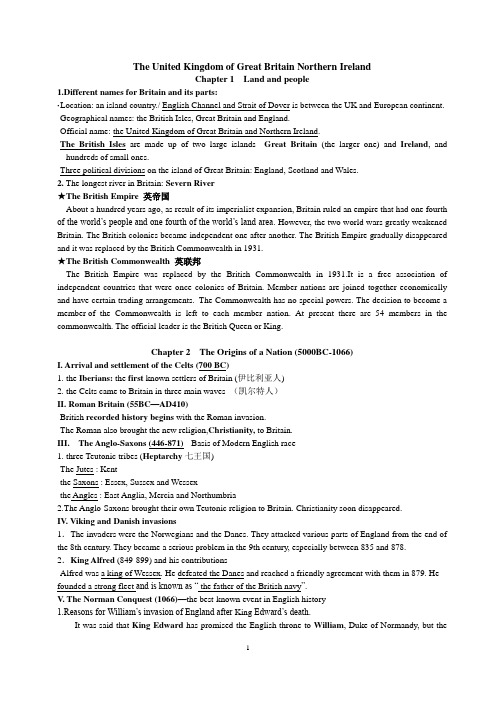
The United Kingdom of Great Britain Northern IrelandChapter 1 Land and people1.Different names for Britain and its parts:·Location: an island country./ English Channel and Strait of Dover is between the UK and European continent. ·Geographical names: the British Isles, Great Britain and England.·Official name: the United Kingdom of Great Britain and Northern Ireland.·The British Isles are made up of two large islands---Great Britain(the larger one) and Ireland, and hundreds of small ones.·Three political divisions on the island of Great Britain: England, Scotland and Wales.2. The longest river in Britain: Severn River★The British Empire 英帝国About a hundred years ago, as result of its imperialist expansion, Britain ruled an empire that had one fourth of the world’s people and one fourth of the world’s land area. However, the two world wars greatly weakened Britain. The British colonies became independent one after another. The British Empire gradually disappeared and it was replaced by the British Commonwealth in 1931.★The British Commonwealth 英联邦The British Empire was replaced by the British Commonwealth in 1931.It is a free association of independent countries that were once colonies of Britain. Member nations are joined together economically and have certain trading arrangements. The Commonwealth has no special powers. The decision to become a member of the Commonwealth is left to each member nation. At present there are 54 members in the commonwealth. The official leader is the British Queen or King.Chapter 2 The Origins of a Nation (5000BC-1066)I. Arrival and settlement of the Celts (700 BC)1. the Iberians: the first known settlers of Britain (伊比利亚人)2. the Celts came to Britain in three main waves (凯尔特人)II. Roman Britain (55BC—AD410)·British recorded history begins with the Roman invasion.·The Roman also brought the new religion,Christianity, to Britain.III. The Anglo-Saxons (446-871)--Basis of Modern English race1. three Teutonic tribes (Heptarchy七王国)·The Jutes : Kent·the Saxons : Essex, Sussex and Wessex·the Angles : East Anglia, Mercia and Northumbria2.The Anglo-Saxons brought their own Teutonic religion to Britain. Christianity soon disappeared.IV. Viking and Danish invasions1.The invaders were the Norwegians and the Danes. They attacked various parts of England from the end of the 8th century. They became a serious problem in the 9th century, especially between 835 and 878.2.King Alfred (849-899) and his contributions·Alfred was a king of Wessex. He defeated the Danes and reached a friendly agreement with them in 879. He founded a strong fleet and is known as “ the father of the British navy”.V. The Norman Conquest (1066)—the best-known event in English history1.Reasons for William’s invasion of England after King Edward’s death.It was said that King Edward has promised the English throne to William, Duke of Normandy, but theWitan chose Harold as king. So William led his army to invade England. In Oct. 1066, during the important battle of Hastings, William defeated Harold and killed him. One Christmas Day, William was crowned king of England, thus beginning the Norman Conquest of England.2.SignificanceThe Norman Conquest of 1066 is perhaps ①the best-known event in English history. William the Conqueror ② confiscated almost all the land and gave it to his Norman followers. He replaced the weak Saxonrule with ③a strong Norman government.④Norman-French culture, language, manners and architecture were introduced.Chapter 3 The Shaping of the Nation (1066-1381)I. England's feudalism under the rule of William the Conqueror①Under William, the feudal system in England was completely established. According to this system, the King owned all the land personally. William gave his barons large estates in England in return for a promise of military service and a proportion of the land's produce.②One peculiar feature of the feudal system of England was that all landowners must take the oath of allegiance,not only to their immediate lord, but also to the king.③William replaced the Witan with the Great Council④William sent his clerks to compile a property record known as Domesday Book (a property record)⑤William’s policy towards the cherch was to keep it completely under his control, but at the same time to protect church’s power.II. Henry II’s measures to consolidate the monarchy① he strengthened the Great Council to help him rule the kingdom.② he strengthened th e king’s court and divided the whole country into six circuits.③ a common law was gradually established in place of the previous laws of the local barons.④ this circuit court led to the founding of the jury system which replaced the old ordeal-based trial system.⑤ he reformed certain abuses in church courts by restricting the power of the archbishopIII. Conten t s and the significance of the Great Charter(Margna Carta)1.Great Charter was signed by King John in 1215 under the press of the barons. It consists of sixty-three clauses. Its important provisions are as follows: (1) no tax should be made without the approval of the Great Council; (2) no freemen should be arrested, imprisoned or deprived of their property; (3) the Church should possess all its rights, together with freedom of elections, etc.2. Although The Great Charter has long been popularly regarded as the ① foundation of English liberties, it was a ②statement of the feudal and legal relationships between the Crown and the barons, ③a guarantee of the freedom of the Church and a ④ limitation of the powers of the king. The spirit of the Great Charter was the limitation of the powers of the king, keeping them within the bounds of the feudal law of the land.IV. The origins of the English Parliament· The Great Council is known to be the prototype (原型)/earliest of the current British Parliament. In 1265, Simon de Montfort summoned the Great Council, together with two knights from each county and two citizens from each town. It later developed into the House of Lords and the House of Commons. Its main role was to offer advice,not to make decisions. There were no elections or parties. And the most important part of Parliament at that time was the House of Lords.·In order to collect tax, Edward I summoned the so-called “ Model Parliament” in 1295, which symbolized the real parliament came into being.V. The Hundred Y ears' War(1337—1453) and its consequences.1.The Hundred Y ears’ War refers to a series of wars between England and France that lasted intermittently from 1337 to 1453.2. Joan of Arc (1412-1431)Joan of Arc was a nation heroine in French history. She led and encouraged the French in driving the English out of French in the Hundred Y ears’ War.3.Consequences of the war①The English lost the war. The English being driven out of French is regarded as a blessing for both countries.②It helped the separate development of English and French national identity. ③English language was reestablished as the official language.Chapter 4 Transition to the Modern Age (1455-1688)I. The nature (性质) and consequences of the Wars of the Roses (1455—1485)·It refers to the battles between the House of Lancaster, symbolized by the read rose, and that of Y ork, symbolized by the white, from 1455 to 1485. Henry Tudor, descendant of Duke of Lancaster won victory at Bosworth Fireld (last battle) in 1485 and put the country under the rule of the Tudors.·Ordinary people were little affected and went about their business as usual. From these Wars, English feudalism received its death blow. No less than 80 nobles of royal blood were killed in the wars. The great medieval nobility was much weakened.II. Henry VIII and The English Reformation1. Henry VIII was above all responsible for the religious reform of the church. There were three main causes: a desire for change and reform of church had been growing for many years; the privilege and wealth of the clergy were resented; and Henry needed money.2. The reform began as a struggle for a divorce and ended in freedom from the Papacy. Henry VIII wanted to divorce Catherine but the Pope refused.· purpose: Henry’s reforms was to get rid of the English Church’s connection with the Pope, and to make an independent Church of England.(用国王的王权至尊取代教皇的神权至尊)· measures: He dissolved all of England’s monasteries and nunneries because they were more loyal to the Pope than to their English kings.· results: He established the church of England as the national church of the country, and he made himself the supreme head of the church of England.·effects:①Henry VIII’s reform stressed the power of the monarch②English religion began to transform from Catholicism to Protestant ideology.III. Elizabeth I (1558-1603)1. Elizabeth's religious reformElizabeth's religious reform was a compromise of views. She broke Mary's ties with Rome and restored her father's independent Church of England, i.e. keeping to Catholic doctrines and practices but to be free of the Papal control. Her religious settlement was unacceptable to both the extreme Protestants known as Puritans and to ardent Catholics.2. significance of the defeat of the Spanish Armada in 1588 (西班牙无敌舰队)①showed England’s superiority as a naval power② meant a decisive check to the attempt of Catholism to recover the northern countries of Europe③It enabled England to become a great treading and colonizing country in the years to come.IV. The English RenaissanceIt was the revival of classical literature and artistic style in European history. Humanism was the mainstreamin literature and arts. The greatest Literary writer of the English Renaissance was William Shakespeare.V. The Civil Wars/Puritan Revolution (1642—1651) and their consequences1. Charles I---Cavaliers---Charles I was executed (January 30,1648)Parliament---Roundheads---Oliver Cromwell became the most powerful man in England2. The English Civil War not only overthrew feudal system in England but also shook the foundation of the feudal rule in Europe. It is generally regarded as the beginning of modern world history.VI. The Commonwealth (共和国) under Oliver Cromwell (1649—1660)Cromwell was leader of the first civil war against C harles I. His famous “Ironside” cavalry and New Model Army(新模范军) defeated the king. After the War he was made Lord Protector of the Commonwealth of England (1653). After king Charles I’s exection in 1649, Oliver Cromwell and the “Rump”(残余国会)declared England a Commonwealth.There was no king, no House of Lords in England. The Commonwealth ended in 1660 when Charles II became king.VII. The Glorious Revolution of 1688· Charles II was succeeded by his brother James II, who was a Catholic and hoped to rule without giving up his religious views. But England was no more tolerant of a Catholic king in 1688. So the English politicians rejected James II, and appealed to a Protestant king, William of Orange (hasband of Mary), to invade and take the English throne. William landed in England in 1688. The takeover was relatively smooth, with no bloodshed, nor any execution of the king. This was known as the Glorious Revolution.· William and Mary jointly accepted the Bill of Rights (1689) which, ①excluded any Roman Catholic from the succession, ②confirmed the principle of parliamentary supremacy and ③guaranteed free speech within both the House of Lords. Thus the age of constitutional monarchy, of a monarchy with powers limited by Parliament, began.·In 1702, Mary’s sister, Anne, came to tbe throne. It was during Anne’s reign that the name Great Britain came into being when, in 1707, the Act of Union united England and Scotland.Chapter 5 The Rise and Fall of the British Empire (1688-1990)I. The Industrial Revolution (1780-1830)1. definition: The industrial Revolution refers to the mechanisation of industry and the consequent changes in social and economic organization in Britain in the late 18th and early 19th centuries. Or it means the invention and appliance of various machines in production and the changes that transformed Britain from a rural and agricultural country into an urban and manufacturing one.2. Britain was the first country to industrialize.3. Its effect/consequence on the development of Britain· Turned Britain into the “workshop of the world”· Towns grew rapidly and became the source of the nation’s wealth.· It simplified the class structure. The middle class became the capitalists, while the lower class became the working class, or the proletariat (无产阶级).II. The Chartist Movement (1836-1848)1.definition: it was a mass movement of the working class to fight for equal political and social rights.4.Result and significance of the Chartist Movement①The Chartist Movement failed because of its weak and divided leadership, and less mature of working class.②The Chartist movement, however, was the first nationwide working class movement and drew attention to serious problems.III.Building of the British EmpireThe colonial expansion: began with the colonization of Newfoundland in 1583.1. the growth of dominions: British colonialists stepped up their expansion to Canada, Australia, and New Zealand, in the late 18th and the early 19th centuries.2. The Conquest of India: Queen Victoria became Empress of India.3. The Scramble for Africa: slave trade4. Aggression against China: Opium War/China became a semi-colonial and semi-feudal countryBy 1900, Britain had built up a big empire, “on which the sun never set”.VI. Britain and the First World War (1914---1918)·The Word War I was fought from 1914 to 1918 primarily between two European Power blocs: “the Central power” and the “Allies”. The war ended by The Treaty of V ersailles (June, 1919), imposed on Germany, formalized the Allied victory.· During the war, the Britain lost over a million people, most of them under the age of 25. Apart from the loss of manpower, there had been considerable disruption of the economy and society.VII. Britain and the Second World War (1939---1945)·The war fought from 1939-1945 mainly between the two power blocs: the Axis and the Allies. Winston Churchill, the Prime Minister, led his country to final victory in 1945.·result and influence ①She lost one-quarter of her national wealth and ②her sea supremacy. ③Britain entered upon a period of economic and social disruption.④The independent movement of her colonies hastened its decline of empire.⑤British Empire was replaced by the British Commonwealth of Nation, a loosely organized community of former British colonies.Chapter 6 Government and PoliticsI. The Monarchy in Britain· the continuity of the monarchy has been broken only once, from 1649-1660 during the Civil War.· role and function: ①the official head and symbol of the whole nation. ②on the advice of the Prime Minister, she performs important acts of the government. ③the official head the Commonwealth.II. Parliament and its functions1. The main functions:(1) to pass laws (legislature); (2) to provide, by voting for taxation, the means of carrying on the work of government(通过投票批准税收,为政府工作提供资金); (3) to examine government Policy and administrations, including proposal for expenditure (检测政府政策和行政管理,包括拨款提议); and (4) to debate the major issues of the day.2. The House of Lords(judiciary)The House of Lords is presided over by the Lord Chancellor(大法官). It is the non-elected House that acts as a chamber of revision, complementing but not rivaling the elected House.(非选举的上议院是修正议院,补充而不是反对由选举产生的下议院)3. The House of Commons (the source of real political power)· The House of Commons is elected by universal adult suffrage and consists of 650 Members of Parliament (MPs).· The Political Party System: the Conservative Party and the Labor Party· The leader of the party with the majority of seats becomes the Prime Minister, or the head of the government. He then chooses a Cabinet with key ministers.· The leader of the Opposition, who is the head of the largest defeated party, appoints a Shadow Cabinet with shadow minister.Chapter 7 Government and PoliticsI. The Justice 司法机构1. Criminal Courts刑事法庭local magistrates’ courts (治安法院)------the Crown Court (with a jury)------Court of Appeal------House of Lords2. Civil Courts 民事法庭County Courts (郡法庭90% civil cases are heard)------High Court------Court of Appeal------House of Lords II. The Judiciary 司法部门There is no ministry of justice in UK. Central responsibility lies with the Lord Chancello r or the Home Secretary.The United States of AmericaChapter 1 Geography and PeopleI. Geographical locationlocation: Canada to its north, Mexico to its south, the Atlantic Ocean to its west and the Pacific Ocean toits west.II. National T erritory1. three parts: the mainland, Alaska and Hawaii.2. 50 states: Alaska is the largest in area, but Texas is the largest state on the mainland.3. America is the fourth largest country in the world in size after Russia, Canada and China.4. the top three biggest city: New Y ork, Los Angeles, ChicagoIII. Geographical Regions1. The New England· birth place of America : Plymouth colony and Boston· Education: Harvard, Y ale and Massachusetts Institute of Technology2. The Middle Atlantic States· the nerve centre: capital city Washington D.C/financial centre New Y ork city/historical city Philadelphia3. The Midwest·agricultural area: lies almost entirely within the Interior Plain/the Mississippi River flows through thi s region (the largest river system in North America)· leading centre of heavy industry: Chicago is the largest industrial city in USA. Detroit is the automobile capital of the world.4. The South· Florida: leading vacation resort5. The America West (beautiful natural sites)· Rocky Mountain: backbone of the North America· The Y ellowstone National Park: the first national part in the world (1872)· The Grand Canyon· Las V egas: the biggest city in Nevada. It is internationally renowned resort city for gambling, shopping and fine dining.6. The Pacific Coast· Settle: lies in Washington. Landmarks: the Space Needle/the Pike Place Market· San Francisco: the Chinatown here is the largest Chinese settlement in the US.· Silicon V alley : the kingdom of electronic industry and computers.· Los Angeles: entertainment industry: Hollywood/the OscarIV. Population and Ethnic Group1. The U.S.A., with a population of 312 million in 2010, is the third most populous country in the world.2. America is a nation created by immigrants. The White makes up 78% of total population, while the minorities 22%.· “first Americans”: the Indians· European immigrants: mainly British, Irish, Germans and Jews· the Blacks from Africa· Asian immigrants: mainly Chinese and Japanese★Black people and the Civil Rights Movement (lead by Martin Luther King)1. Blacks are the largest of the racial and ethnic minorities in the U.S. The first blacks were brought to North American as slaves in 1619. The slave system was formally ended by Lincoln’s Emancipation Proclamation in 1863. The Civil Rights Movement in the 1960s demanded desegregation and equal right.2. Two Acts·The Civil Rights Act of 1964---protect the right to vote, to use public facilities and to enjoy the same education as white people. It also contained provisions guaranteeing equal employment opportunities. ·The voting Rights Act of 1965---guarantee the blacks and others the right to vote.Chapter 2 American HistoryI. The “discovery” of the New Worl dChristopher Columbus, an Italian navigator, supported by the Spanish queen, started his first trip across the Atlantic Ocean in 1492. He reached some small islands in Middle America and called the local residents as the “Indians”. Ameriga V espucci proved that the land discovered by Columbus was a new continent. Therefore, the land was named America after him.II. Colonial Era1. The first English colony in the America was founded at Jamestown, Virginia, in 1607. Between1607 and 1733 the British established 13 colonies along the east coast of North America.2. In 1620, 201 of Pilgrims sailed to the New World in a ship called Mayflower. They arrived at Plymouth and built the Plymouth colony. The Puritans(清教徒)wanted to purify the Church of England and were threatened with religious persecution. The Puritan leaders saw the New World as a refuge provided by God for those He meant to save.III. The War of Independence (1775—1783)1. the causes: the British government wanted to bring the development of America under control and collectmore taxes to finance its army; the East Indian Company sold tea at a lower price, which took away tea business from American tea merchants.2. blasting fuse: The Boston T ea Party (1773)In 1773, several Boston residents secretly boarded the tea ships of the East India Company and threw the tea into the harbor.3. The First Continental Congress was held in Philadelphia in 1774. The 13 colonies united together and encouraged Americans to refuse to buy British goods4. The Second Continental Congress was held in Philadelphia in 1775.①founded a Continental Army and Navy under the command of George Washington; ②appointed a committee to draft the Declaration of Independence (Thomas Jefferson as chairman), which was adoptedby Congress on July 4, 1776.5. Result: In 1783, the Treaty of Paris was signed. Britain recognized the independence of the United States.IV. T erritorial Expansion and Westward Movement (19the century)· In 1803, America purchased Louisiana from France and its territory was doubled.· 1845-1848: Through Mexican-American War, Mexico was forced to cede Texas, New Mexico, Arizona and California.· Meanwhile, people from the east moved toward the west for more lands and better life, which developed the west massacred the Indians.V. The American Civil War (1861—1865)1. Northern States---Abraham Lincoln—maintain the Federal Union (北部联邦)Southern States---Confederate States of America (南部同盟)2. cause of the war: economic conflict between the capitalist economy in the North and the plantation in the South.3. Abraham LincolnSoon after Lincoln became the President, the War broke out in April, 1861. Lincoln realized that he coul d win support for the Union at home and abroad by making the war a just war against slavery. So he issued the famous Emancipation Proclamation in 1863, which transformed the war from a war to save the Union to a war to abolish slavery.3. Turning point---war at GettysburgThe Union troops defeated the Confederate troops at Gettysburg. Lincoln made his famous Gettysburg Address: that the government of the people, by the people, for the people, shall not perish from the earth.4. Significance of the Civil War: ①America became a single and indivisible nation. ②Slavery was completely abolished, which paved the way for the development of capitalism.VI. America during the 20th Century1. America during WWI (1914-1918)·Policy: neutrality (Wilson)→pro-Ally partiality: sold arms and military supplies to Britain and France. · be involved in war in 1917· after the war, America became one of the Big Four (the United States, Britain, France, Italy)2. the Roaring 1920s· a period of material success and spiritual frustration and confusion·Lost Generation: Ernest Hemingway3. Great Depression (1929-1933)In October 1929, the Great Depression was started from the New Y ork Stock Exchange crash. The depression soon spread to the whole capitalist world. Thousands of banks and businesses went bankrupt. Many people lost their jobs. American economy was seriously weakened. It was due to Roosevelt’s New Deal started in 1933 that America finally recovered from the depression.4. America during the WWII (1937-1945)· America was involved in WWII in 1941 when Japan attacked Pearl Harbor.·Two guiding principles: the first was to win the war, the second was to establish a postwar political structure in accord with American interest and to prevent the Soviet Union from over-expansion.· after WWII, America became the strongest power in the Western world.5. the Cold War (1945-1989)· Cause: conflicts between the U.S.A. and the Soviet Union about their separate concepts of postwar world order.·The Truman Doctrine: beginning of the Cold War./ its core was anti-communism.·The Marshall Plan: economic aid to the Western European countries in order to prevent them from possible socialist revolution and the over expansion of Soviet Union.· President Nixon was the first American president who visited the PRC in 1972.·Cold War was ended in 1989 when Soviet was collapsed.。
主要国家英文名称汇总
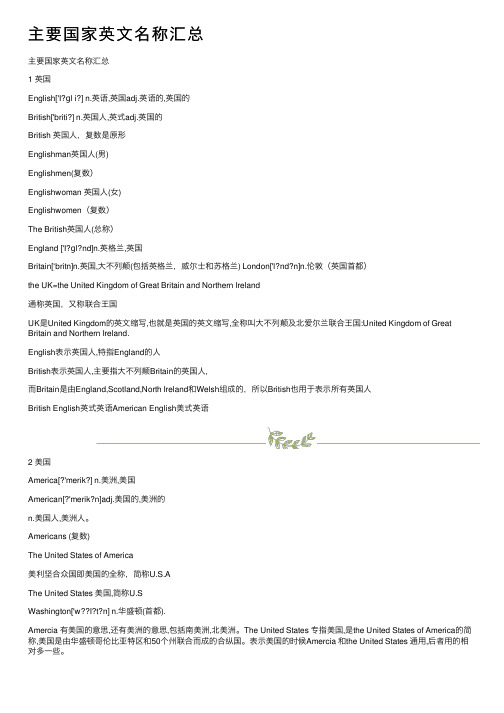
主要国家英⽂名称汇总主要国家英⽂名称汇总1 英国English['I?ɡl i?] n.英语,英国adj.英语的,英国的British['briti?] n.英国⼈,英式adj.英国的British 英国⼈,复数是原形Englishman英国⼈(男)Englishmen(复数)Englishwoman 英国⼈(⼥)Englishwomen(复数)The British英国⼈(总称)England ['I?ɡl?nd]n.英格兰,英国Britain[‘britn]n.英国,⼤不列颠(包括英格兰,威尔⼠和苏格兰) London['l?nd?n]n.伦敦(英国⾸都)the UK=the United Kingdom of Great Britain and Northern Ireland通称英国,⼜称联合王国UK是United Kingdom的英⽂缩写,也就是英国的英⽂缩写,全称叫⼤不列颠及北爱尔兰联合王国:United Kingdom of Great Britain and Northern Ireland.English表⽰英国⼈,特指England的⼈British表⽰英国⼈,主要指⼤不列颠Britain的英国⼈,⽽Britain是由England,Scotland,North Ireland和Welsh组成的,所以British也⽤于表⽰所有英国⼈British English英式英语American English美式英语2 美国America[?'merik?] n.美洲,美国American[?'merik?n]adj.美国的,美洲的n.美国⼈,美洲⼈。
Americans (复数)The United States of America美利坚合众国即美国的全称,简称U.S.AThe United States 美国,简称U.SWashington['w??I?t?n] n.华盛顿(⾸都).Amercia 有美国的意思,还有美洲的意思,包括南美洲,北美洲。
